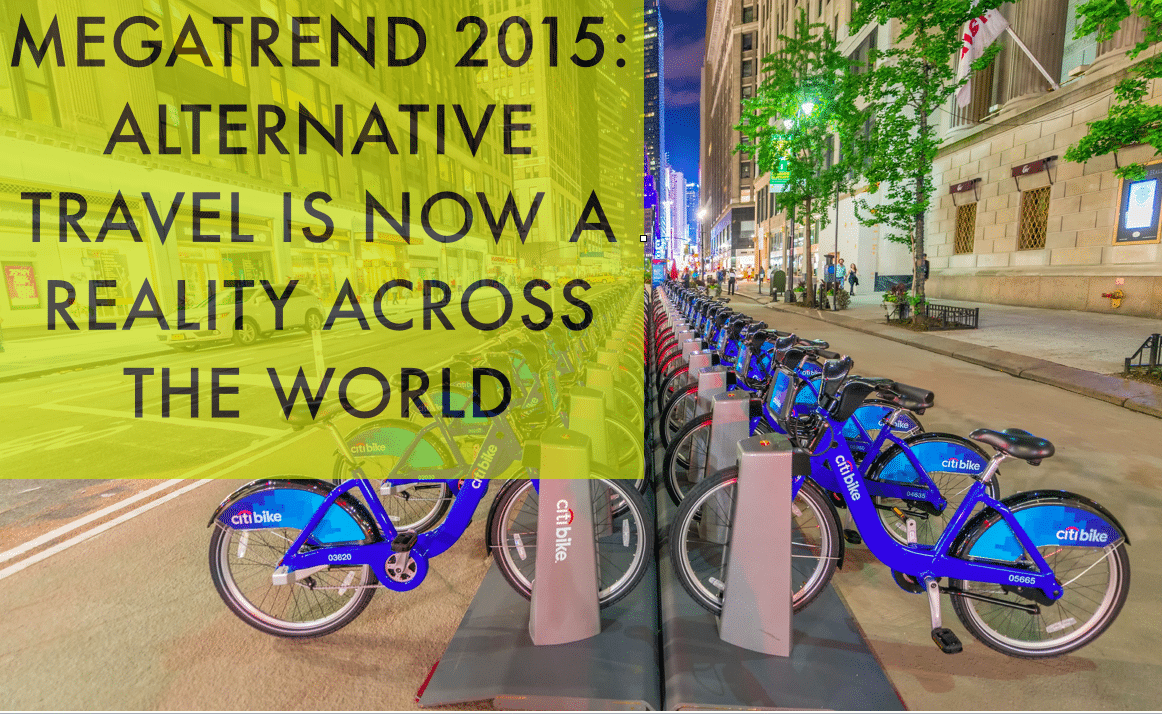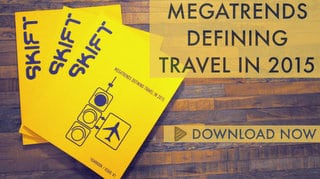Skift Take
The sharing economy has spread to every sector of the travel industry and every corner of the globe pushing it from a small community of global explorers to a full-fledged industry needing regulation and customer protection like the traditional market it sought to complement.
Last month we launched our first ever magazine, Megatrends Defining Travel in 2015, where we identify the global trends in travel in 2015 and beyond, and focus on three emerging key themes: Mobile. Seamless. Experiential. Below is an extract from the one of the trends in the magazine.
Book a room at big box Marriott. Sign up for a packaged double-decker bus tour. Wait as the hotel concierge hails you cab to his restaurant recommendation. Isolated from reality, travelers often wonder about the lives of people who actually live in the city they are visiting.
This experience, a byproduct of limited access and awareness, was once the only way to explore a new city. A frustration that’s birthed a second option taking travelers into quaint East Village apartments, on intimate walking tours led by local professors, and to community meals shared with strangers in Williamsburg lofts.
The sharing economy — once an indie endeavor questioned by discerning adults — has gone mainstream and made peer-to-peer transactions available at every step of the travel experience in cities large and small around the world. Its scope in both the kinds of experiences offered and where they are available is expanding daily.
Services have spread outside of major launch cities both by nature of the platform and demand from travelers who now consider brand-name hotels and packaged tours taboo. Its growth is fueled by the marketplace model, which has taken the best of online, mobile, and social to create travel products that allow people to find rides or alternative accommodations with previously unheard of ease.
Transactions are easier, discovery is faster, and feedback is transparent. Many times the middlemen are rendered obsolete and global access to Internet makes their geographic reach unlimited.
These tools allow travelers to approach immediate geographies as locals would, with information and opportunity for immersion at their fingertips. The success of alternative new players has shown the historical errors of regulation and proven that disregard for local laws is not necessarily a hindrance to success.
Lodging has undergone the most disruption as a result of the sharing economy’s growing ubiquitousness. Airbnb has become the poster child of the movement given its brand awareness, breadth of inventory, and fight for legitimization worldwide. There are; however, dozens of home rental and exchange platforms catering to different customers.
In addition to the apartments and tree houses offered on Airbnb, a guest can choose to stay in a luxury villa or apartment prepared and stocked by Luxury Retreats or OneFineStay, an entire home for one or two weeks via HomeAway, a couch for free through CouchSurfing, or a tent in a local’s backyard with the help of CampinMyGarden.com.
Guests can forgo airport car rentals and rent out an individual’s car via RelayRides and FlightCar or get from point A to point B with on-demand car services Uber and Lyft. Others looking for a less traditional ride can rent RVs on RVShare or bikes onSpinlister.
Outside of traditional tours, platforms including SideTour and Vayable promise local-led tours that share insights on everything from architecture to zeppolis and give travelers a chance to chat and explore with local residents.
It’s become easier than ever to find local, top-rated restaurants with tools like Yelp and Foursquare; however, there’s still nothing like a home-cooked meal in a new place. Travelers can book at a seat a local dinner party through EatWith and Feastly or hire area chefs for home-cooked cuisine through KitchenSurfing.
Geographically, dinner parties via EatWith are taking places from Lisbon to Tel Aviv, bikes on Spinlister are available from Jakarta to Porto Alegre, and Lyft’s pink mustache can be spotted in Albuquerque and Spokane. Airbnb and Uber, with their multi-million valuations, are on another level with listings and drivers available in more than 34,000 cities and 50 countries, respectively.
As the listings and opportunities for this kind of travel widens in both scope and location so do the opportunities for danger and corruption from fake listings, quick cash schemes, and guests who just won’t leave. Combatting this takes increased surveillance from companies who often pass the responsibility of discretion off to their communities.
This coming year will see high-growth platforms investing in their customers’ protection and safety on both sides on the transaction.
We want to thanks our magazine sponsors Virgin Atlantic, Amadeus and Egencia for making this possible.
The Daily Newsletter
Our daily coverage of the global travel industry. Written by editors and analysts from across Skift’s brands.
Have a confidential tip for Skift? Get in touch
Tags: airbnb, megatrends 2015, sharing economy, uber

